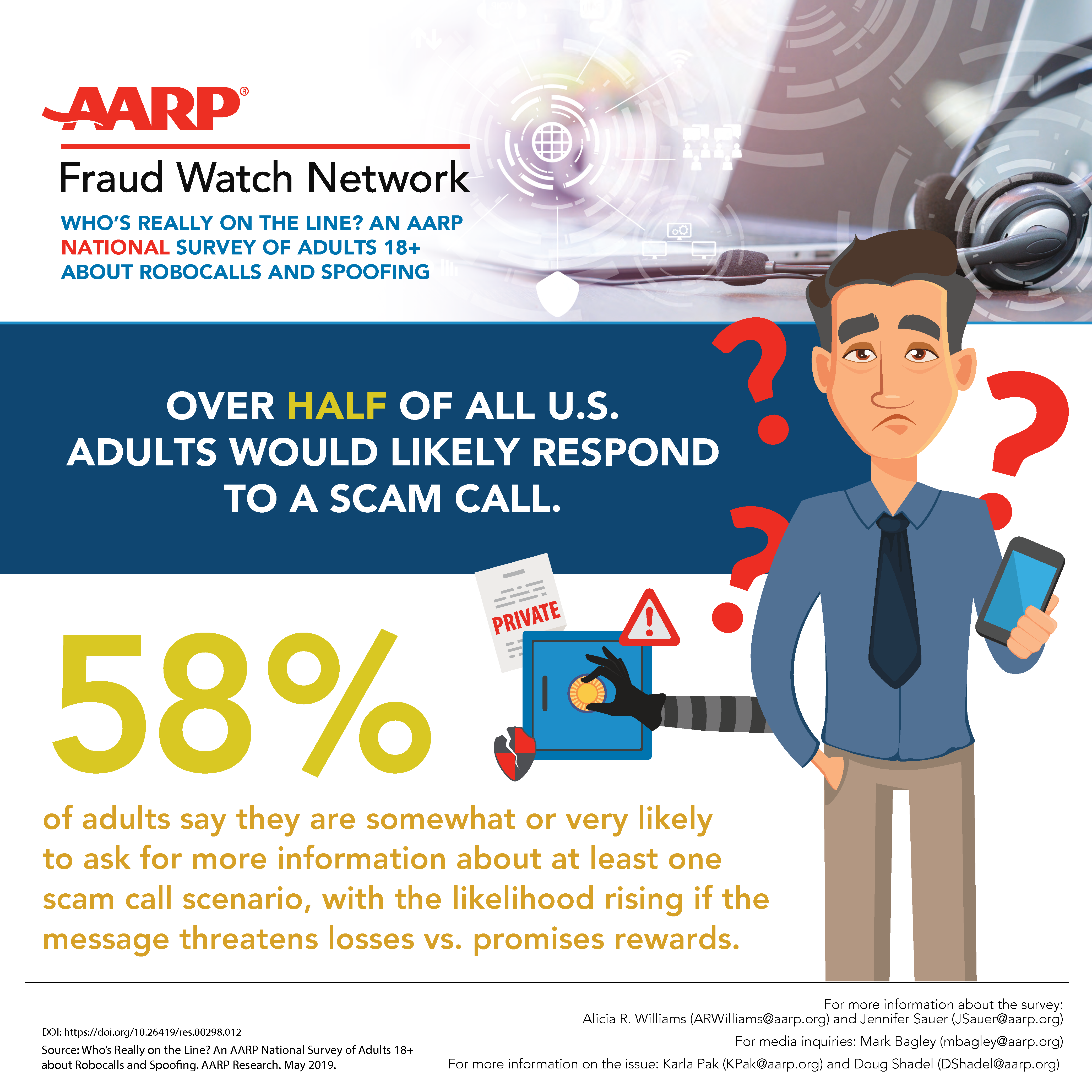AARP Hearing Center

While a large majority of Americans suspect that most of the automated telephone messages – or “robocalls” – that they receive are attempts at scams, few are taking actions to protect themselves, according to results of a new survey from the AARP Fraud Watch Network.
An estimated 48 billion robocalls came into the United States last year. Nearly half of U.S. adults surveyed by AARP said they receive seven or more robocalls per week.
Automated call technology has brought efficiency to mass telephone notifications, with companies using robocalls for flight or school cancellations, polling and other legitimate purposes. AARP itself uses robocall technology to reach its members with educational programming, including how to stay safe from scams and fraud. The technology, however, has also made it easier and cheaper for con artists to reach millions with their fraud schemes. Telephone scams cost U.S. consumers $429 million last year, according to the Federal Trade Commission.
AARP’s survey verified that nearly all consumers rely on caller ID when deciding when to answer a call, even though three in four say they know the information that shows up may be fabricated, or “spoofed.”
Spoofing has given the criminals the upper hand: The survey found that U.S. adults are more likely to answer a call seemingly from a local area code (59%), an area code where friends or family live (44%), or an area code and telephone exchange that matches their own (36%).
“Be wary when you pick up the phone. A number that looks familiar or local may be neither familiar nor local,” said Kathy Stokes, director, fraud prevention programs, AARP. “Con artists have become increasingly sophisticated and devious, and once they connect with you and get you talking it’s far too easy to fall prey to their schemes.”
AARP’s survey shows that people are more likely to be victimized by scam pitches involving threatened losses – “You owe unpaid taxes” or “You are facing jail time for missing jury duty” – than those promising rewards – “You’ve won the foreign lottery” or “You qualify for a free vacation.” One-quarter more more respondents (51%) said they would respond to a negative or fear-based call scenario than those who said a positive or promise-of- wealth pitch would prompt them to engage (41%).
To help protect against illegal robocalls, the AARP Fraud Watch Network recommends that consumers add their telephone numbers to the National Do Not Call Registry. Only about half of the survey respondents said they have done so. Registering your number will not put a stop to fraudulent calls, but it will make them easier to recognize since most legitimate telemarketers do not call numbers on the registry.
The FWN also recommends exploring free or low-cost call-blocking apps, and urges consumers to report all scam calls to the proper authorities. For a complete list of “do’s” and “don’ts” regarding illegal and scam robocalls, visit www.aarp.org/FraudWatchNetwork.
Ninety percent of U.S. adults said they want the government to do more to reduce the number of fake and misleading robocalls, and efforts are underway on the federal level:
- A bill with bipartisan support in the U.S. Senate, the Telephone Robocall Abuse Criminal Enforcement and Deterrence Act or “TRACED Act,” would require telecom providers to use call authentication technology that would block many illegal robocalls. The legislation, endorsed by AARP, has been approved by the Senate Commerce Committee and a vote by the full Senate is pending.
- A rule proposal by the Federal Communications Commission would similarly require phone companies to implement technology to detect and block illegal robocalls. The FCC will vote on the proposal at its June 6 meeting.
For more findings from the AARP survey, see the research report, “Who’s Really on the Line?”
The AARP Fraud Watch Network launched in 2013 as a free resource for people of all ages. Consumers may sign up for “Watchdog Alert” emails that deliver information about scams, or call a free helpline at 877-908-3360 to report scams or get help from trained volunteers in the event someone falls victim to scammers’ tactics. The Fraud Watch Network website provides information about fraud and scams, prevention tips from experts, an interactive scam-tracking map and access to AARP’s hit podcast series, The Perfect Scam































































